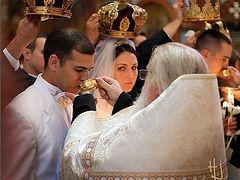Source: The Christian Post
June 6, 2016
Women who were virgins before they got married are the least likely to divorce after five years, but these brides are scarce, according to the results of a new study released Monday by the Institute for Family Studies.
The study also found that women married since the year 2000 who had just two sexual partners prior to marriage are surprisingly just as likely to end up divorced at the same rate after five years as a growing cohort of women who had 10 or more sexual partners before marriage.
And societal changes in attitudes toward premarital sex are partly to blame. Most Americans today, according to the latest studies, believe premarital sex is acceptable and are likely to have three or more sexual partners before marriage.
The study released on Monday was conducted by Nicholas H. Wolfinger, a University of Utah professor of family and consumer studies who recently co-authored Soul Mates: Religion, Sex, Children, and Marriage among African Americans and Latinos, with W. Bradford Wilcox.
Wolfinger uses data from the three most recent waves of the National Survey of Family Growth collected in 2002, 2006-2010, and 2011-2013. The findings, he says, highlights the complex link between premarital sex and marital stability.
"Earlier research found that having multiple sex partners prior to marriage could lead to less happy marriages, and often increased the odds of divorce. But sexual attitudes and behaviors continue to change in America, and some of the strongest predictors of divorce in years gone by no longer matter as much as they once did," notes Wolfinger in the brief on his findings.
"As premarital sex became more acceptable, it's reasonable to anticipate that its negative effects on marital stability waned. In general, Americans became more accepting of nonmarital sex. Certainly fewer men entered marriage with the expectation of a virgin bride. All of the fanfare associated with hooking up is evidence that some young people have become comfortable with the idea of sex outside of serious relationships," Wolfinger added.
Most of the women with minimal sexual experience or practiced abstinence before marriage cited religion as a factor in their life.
"One of the most common reasons for premarital abstinence is religion, and NSFG data support such an interpretation. ... Women who marry as virgins are far more likely than other women to attend church at least once a week," said Wolfinger.
"It's also noteworthy that virgin marriages increasingly became the domain of religious women between the 1980s and 2000s — and during the same years, the divorce rate for virgin brides continued to drop. These findings make sense in light of the fact that people who attend church frequently have lower divorce rates than do non-participants," he added.
While he was unable to provide a scientific explanation for why women who had two sexual partners before marriage were almost as likely as those who had 10 to divorce since the 2000s, he suggested "the notion of over-emphasized comparisons."
"My best guess rests on the notion of over-emphasized comparisons. In most cases, a woman's two premarital sex partners include her future husband and one other man. That second sex partner is first-hand proof of a sexual alternative to one's husband," explained Wolfinger.
"These sexual experiences convince women that sex outside of wedlock is indeed a possibility. The man involved was likely to have become a partner in the course of a serious relationship — women inclined to hook up will have had more than two premarital partners — thereby emphasizing the seriousness of the alternative," he continued.
"Of course, women learn about the viability of nonmarital sex if they have multiple premarital partners, but with multiple partners, each one represents a smaller part of a woman's sexual and romantic biography. Having two partners may lead to uncertainty, but having a few more apparently leads to greater clarity about the right man to marry. The odds of divorce are lowest with zero or one premarital partners, but otherwise sowing one's oats seems compatible with having a lasting marriage," he added.
Wolfinger further noted that aside from religion, race and family of origin accounted for the largest portion of the sexual partners/divorce relationship.
Caucasian and African-American women had similar premarital sexual behavior, but Latinas and members of the "other" population group had notably fewer sex partners and lower divorce rates than either whites or blacks.
People who grew up without both parents had more partners and divorced more.
"It won't be surprising to most readers that people with more premarital sex partners have higher divorce rates, broadly speaking. That said, this research brief paints a fairly complicated picture of the association between sex and marital stability that ultimately raises more questions than it answers," said Wolfinger.





